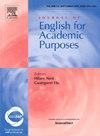Exemplification and its local grammar patterns in English as an academic lingua franca in research writing
IF 3.4
1区 文学
Q1 EDUCATION & EDUCATIONAL RESEARCH
引用次数: 0
Abstract
In this study, we investigate the underexplored rhetorical practice of authors adopting English as a lingua franca (ELF) in academic writing, focusing on their use of exemplification. By giving examples for illustration or clarification, the act of exemplifying is central to the clarity and persuasiveness of research writing. We examined it through a local grammar approach, analysing both its lexico-grammatical and discourse-semantic patterns. Based on the SciELF corpus, which comprises unproofread pre-submission drafts of ELF authors, our analysis shows that for example and “Exemplified – Indicator – Exemplification – Subordinate Category” are the dominant marker and local grammar pattern of exemplification. The use of exemplification also relates to the L1 background, professional status and disciplinary alignment of the ELF authors. Czech and Russian authors made the most and least frequent use of exemplification respectively while Finnish and Czech authors often use variant patterns of the dominant one. Additionally, senior academics, particularly from soft disciplines, make the most of exemplificatory markers and prefer the “Exemplified – Indicator – Exemplification – Relevant Studies” pattern. Our study sheds light on the rhetorical language use by ELF authors, and unravels the value of local grammars in the research of English as an academic lingua franca.
作为学术通用语的英语在研究性写作中的例证及其地方语法模式
在本研究中,我们调查了在学术写作中采用英语作为通用语言(ELF)的作者未被充分探索的修辞实践,重点关注他们对例证的使用。通过举例说明或澄清,举例行为对研究写作的清晰度和说服力至关重要。我们通过局部语法方法对其进行了研究,分析了其词汇语法和话语语义模式。科学英语论文语料库由英语论文作者未校对的投稿前草稿组成,基于该语料库,我们的分析表明,"例如 "和 "例证--指标--例证--从属类别 "是例证的主要标记和局部语法模式。例证的使用还与 ELF 作者的 L1 背景、专业地位和学科排列有关。捷克语和俄语作者使用例证标记的频率分别最高和最低,而芬兰语和捷克语作者则经常使用主导标记的变体模式。此外,资深学者,尤其是来自软学科的学者,最常使用例证标记,并偏爱 "例证--指标--例证--相关研究 "模式。我们的研究揭示了 ELF 作者的修辞性语言使用,并揭示了地方语法在英语作为学术通用语的研究中的价值。
本文章由计算机程序翻译,如有差异,请以英文原文为准。
求助全文
约1分钟内获得全文
求助全文
来源期刊

Journal of English for Academic Purposes
Multiple-
CiteScore
6.60
自引率
13.30%
发文量
81
审稿时长
57 days
期刊介绍:
The Journal of English for Academic Purposes provides a forum for the dissemination of information and views which enables practitioners of and researchers in EAP to keep current with developments in their field and to contribute to its continued updating. JEAP publishes articles, book reviews, conference reports, and academic exchanges in the linguistic, sociolinguistic and psycholinguistic description of English as it occurs in the contexts of academic study and scholarly exchange itself.
 求助内容:
求助内容: 应助结果提醒方式:
应助结果提醒方式:


